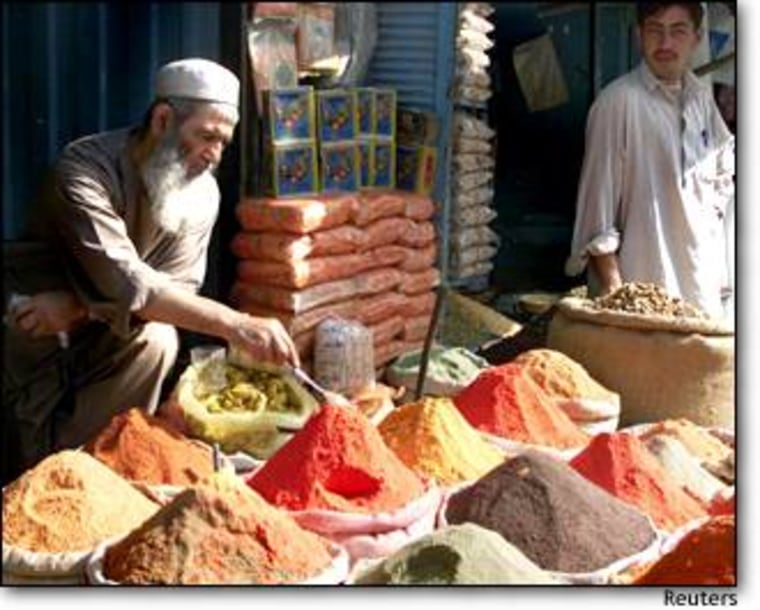A flock of birds sweeps across the rooftops and disappears into the sunlight as dawn arrives in Kabul. The streets begin to fill with traffic. The downtown produce market is bustling. A group of men unloads a truck full of watermelons and others haggle over the price of grapes.
Across town, 21-year-old Hasib rounds a corner and heads towards his store. He is wearing new blue jeans, a dark-blue shirt, a belly pack and the latest in shades.
Hasib, who set up his computer store a week after the Taliban fled, is part of Afghanistan’s fledgling class of entrepreneurs. Like many in dusty Kabul, he starts his day by wiping off his merchandise — shelves filled with software and a few old desktop computers. His sales average $2,000 a month, but he says he will never forget the day a buyer from an aid organization came in and spent $8,000. During the days of the Taliban, he taught clandestine computer science classes in his home, earning next to nothing.
But the biggest change in his life is that he can now see his girlfriend in public. “We talk on the telephone and most times we take walks in the park,” he says.
Building a capital
Outside his store, the traffic is fierce. Yellow and white taxi cabs dart between SUVs. Traffic jams are now commonplace in a town where until recently bicycles ruled the streets. The few working traffic lights flash to no avail, as drivers ignore the rules of the road.
Nearby, construction crews work furiously to complete a half-finished, seven-story building that stood untouched during the Taliban era for being “non-Muslim.” Taliban officials claimed the height of the building would allow occupants to peer down into people’s houses, violating their privacy.
A few blocks away, on fashionable Flower Street, upscale stores are filled with an array of foods. “You know this place is changed when I can walk into a store and buy a Dr. Pepper soda,” says one Afghan American.
Flower shops are doing a brisk business as people pick up on wedding plans they had put on hold over the past four years while waiting for better times.
One shopkeeper named Ahmad decorates a car with red and white ribbons and balloons.
“We had so few customers. We almost had to shut down. I have been working nonstop since January, but it feels good,” Ahmad says as the festooned car drives off.
Wedding dreams come true
Loud music fills the Khyber Restaurant, where 200 people have gathered for a wedding.
Inside, it’s clear that, despite the ouster of the hard-line Taliban, some conservative traditions persist. On one side of the hall, the tables are filled with men. The younger ones move on the dance floor as a singer belts out an old Afghan classic.
On the other side of the room sit the women. Little girls twirl on tabletops to the music while young women mix it up in a corner, holding their hands in the air as they sway to the music.
A huge wedding cake is presented, and the bride and groom enter the restaurant to a roar of applause.
As the sun begins to set, Afghan expats gather in the lobby of the Intercontinental Hotel to drink tea and discuss their latest efforts in trying to turn around this nation’s fortunes. By nightfall, the area by Kabul’s cinema is bristling with excitement. People stroll along the boulevard, their faces illuminated by shop fronts’ multicolored fluorescent lights. Restaurants are packed and white smoke from kebab stands billows into the air.
Later, the still of the night is broken by the call to prayer from the soaring muezzins at the city’s mosques. The sun begins to rise and after so many years the dawn in Kabul is vibrant once again.
